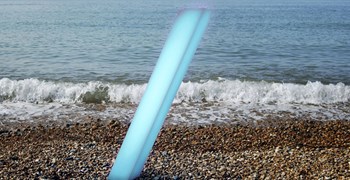Hotel plan could save World War Two Redsand Forts off Kent coast
This article originally appeared on Culture24.
One of the most unusual British relics of World War Two could be saved if an ambitious hotel plan goes ahead
 The towers of Redsand Forts© Courtesy Aros Architects
The towers of Redsand Forts© Courtesy Aros ArchitectsKnown as Uncle 6 during the Second World War, Redsand Forts comprises seven towers - each one a huge metal box held clear of the water by leg-like stilts.
Six of the towers were armed with anti-aircraft guns and one was a searchlight tower to pick out any glint of Nazi metal in the ink-black night skies of wartime Britain.
The towers were decommissioned in 1956, although a few enjoyed a brief second life as pirate radio stations in the 1960s and the design served as inspiration for the first offshore oil platform in the Gulf of Mexico in the late 1940s
Now a new project, led by businessman David Marriot Cooper, hopes to prevent the historic buildings collapsing into the sea.
 A concept visual of the proposed hotel© Courtesy Aros Architects
A concept visual of the proposed hotel© Courtesy Aros ArchitectsCooper approached Aros Architects, who sank considerable time into drafting what is affectionately known as the “rubber ring” concept.
Utilising the wheel-like layout of the towers, the plan will see an engorged central Control Tower become the hotel lounge and restaurant.
Glass bridges will lead off to 40 rooms in the four Gun Towers and four executive suites in the Bofors Tower.
The heritage of the museum will be commemorated as well.
“A museum, dedicated to the ingenuity of civil engineer and designer of the forts, Guy Maunsell, is proposed within the ‘Searchlight Tower’ with its own separate arrival jetty,” say Aros Architects.
Critics of the scheme might argue it is a misuse of heritage buildings, suggesting they should be preserved intact and opened to the public as a museum.
 A masterplan for the proposed hotel© Courtesy Aros Architects
A masterplan for the proposed hotel© Courtesy Aros ArchitectsFor the Trust, maintaining the external appearance of the outside is paramount.
“It is very important to the charity that the external appearance is kept as faithful as possible to the Guy Maunsell plans,” says Robin Adcroft, its Chair.
“The developers would however be free to decide how the internals are re modelled.
“This would apply to six of the seven towers, where one will remain as a wartime museum with perhaps a section relating to the ‘Pirate Radio’ era of the 1960s.”
 Spitbank Fort hotel© Amanda Retreats / Wikimedia Commons
Spitbank Fort hotel© Amanda Retreats / Wikimedia CommonsIf it does get off the ground, it could save an unusual piece of World War Two British heritage from simply falling into the sea.
What do you think? Leave a comment below.
More from Culture24's World War Two section:
World War Two hero sees Blenheim bomber take to the skies again ahead of VE Day airshow
'Defiant' Jack Holmes: The man who built the Boulton Paul Defiant
Aerial photos of WWII airfields join new crowdsourcing American Air Museum website












